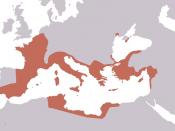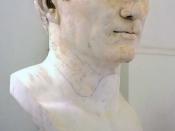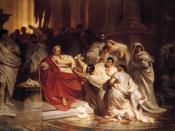Julius Caesar is murdered, and the public wants justification. Act III Scene ii of Shakespeare's Julius Caesar begins with Brutus' speech that attempts to validate his murderous act. He claims that Caesar was a tyrant and his place in power was only hurting Rome. However, his speech has several flaws: it is delivered in prose and filled with irony. After Brutus finishes, Antony harangues the crowd with his famous funeral oration. This oration is said to be some of Shakespeare's finest writing. The meticulous lucubration that encompasses Rogerian structure and clever word association allows Antony to manipulate the plebeians in opposition of Brutus.
To begin, it is widely known that Brutus was a leading conspirator in Caesar's death. In order to refute any charging accusations or opinions, Brutus orates a speech that is given in prose in attempt to associate himself with the plebeians, who speak in prose to portray their lack of education and their barbarianism.
Ironically enough, brutus in Latin means 'stupid'. By using prose, Brutus brings himself down to the plebeian social level, one usually viewed as scum. Arguably, Brutus fits into this category perfectly after he brutishly murders Caesar. Although he attempts to appeal to the plebeians by doing this, he actually flaunts his stupidity and downright vileness. From a rhetorical standpoint, Brutus' prose also creates a larger gap in the eloquence of Brutus' speech and Antony's oration. Since the more educated, like Antony, use verse, which shows intelligence, Antony portrays himself as cultured and well-spoken while Brutus' use of prose shows his utter stupidity. Not only is the delivery ironic, but the actual text as well. "Here comes [Caesar's] body, mourned by Mark Antony, who, though he had no hand in his death, shall receive the benefit of his dying"(III.ii.43-45). In this instance, along...


